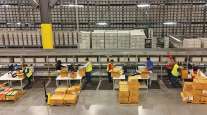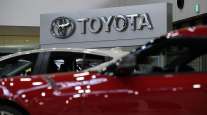Staff Reporter
Fleets’ COVID-19 Safety Practices May Linger After Pandemic Ends
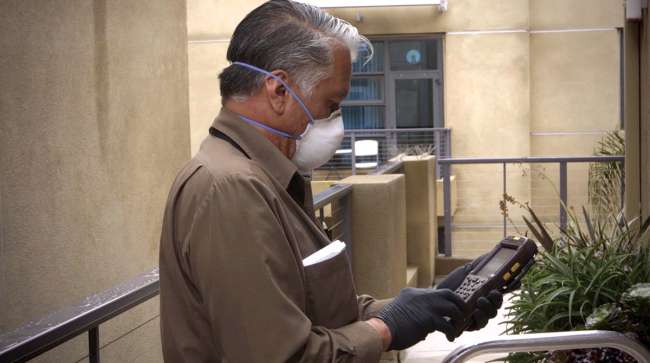
[Ensure you have all the info you need in these unprecedented times. Subscribe now.]
The COVID-19 outbreak prompted transportation companies to adopt a battery of safety measures — some of which may remain in place even after the pandemic is over.
Many fleets, including package-delivery giants UPS Inc. and FedEx Corp., issued personal protective equipment such as masks to employees.
In a display of company pride, United Road, which specializes in vehicle transportation services, made branded fabric masks for its drivers.
At Hub Group, some 3,400 drivers were equipped with gloves, masks, disinfectant material and paper towels.
Luke Simendinger, executive vice president of Hub Group and president of Hub Group Trucking, said the company’s protocol, which remains in place today, requires drivers to disinfect the truck at the start and end of their shifts.
“I think those are just going to be standard operating procedures for us going forward,” Simendinger told TT. “We do quite a bit of slip-seating, so it was ensuring that all PPE was provided. Any individual that’s going in and out of a truck had the disinfectant to do that themselves.”
Hub Group, based in Oak Brook, Ill., ranks No. 13 on the Transport Topics Top 100 list of the largest for-hire carriers in North America.
Stephen Kane, president of Rolling Strong, a fitness and wellness company focusing on professional drivers, said he expects safety protocols that have been put in place to ward off the coronavirus to remain for a while. These measures often deter the spread of all kinds of viruses, not just COVID-19. Plus, a lot of people have turned these safety precautions into habits, he said.
Safety practices also have extended to employees other than drivers.
Scott Hill, manager of recruiting and fleet services at Hill Bros. Transportation, said one big challenge — and success — during the pandemic has been vehicle maintenance.
When a driver brings his or her truck into the shop at the company’s terminal, technicians now wear masks and gloves and disinfect the surfaces of the truck they touch.
Inside the cab, they also take precautions such as cleaning the steering wheel and buttons — “whatever they can do to make sure we’re getting at least another shot at getting some of that bacteria out of the truck,” Hill told TT.
“It’s definitely been tough, but our drivers are the backbone of what we do and we wouldn’t be there without them,” he said.
Hill Bros., based in Omaha, Neb., specializes in dry van and refrigerated trucking services.
For many companies, technology played an important role as they adjusted their operations.
XPO Logistics used the digital dashboard on its XPO Connect technology platform to share government alerts related to COVID-19. Josephine Berisha, XPO’s chief human resources officer, said this service is used by customers and carriers globally.
XPO, based in Greenwich, Conn., ranks No. 3 on the for-hire TT100 list.
United Road, meanwhile, used its technology to communicate with employees on a large scale, especially at the start of the pandemic when many people were feeling apprehensive.
Eric Madison, senior vice president of people and safety at United Road, said the company held virtual town halls and set up a “COVID concerns” email address for people to submit questions or report issues.
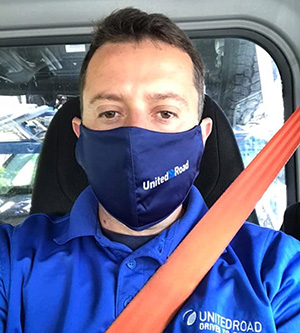
A company driver, Leonardo Machado out of Ayer, Mass., shows off his United Road mask. (United Road)
United Road also worked with its electronic logging device supplier to include a COVID-19 questionnaire for drivers to complete at the start of every pre-trip inspection and established a similar smartphone app for office employees.
“We keep a finger on the pulse of the drivers as well,” Madison told TT. “We get a heads-up if there’s ever any need for concern.”
United Road Services, based in Plymouth, Mich., ranks No. 52 on the for-hire TT100 list.
In an effort to reduce the spread of germs, many companies also switched to contactless delivery methods.
UPS, which ranks No. 1 on the for-hire TT100, suspended requirements for customers to sign for “signature required” packages, according to company spokesman Matthew O’Connor.
When possible, Hub Group pursued paperless services with customers. Simendinger said this practice was especially useful in the intermodal business, which involves lots of handoffs.
At United Road, employees shifted to touchless deliveries. Its drivers previously collected signatures on their mobile devices. Hill said many customers have transitioned to using electronic paperwork with Hill Bros. drivers, a change he expects is here to stay.
“Quite a few of the customers we’ve worked with have physical paperwork that they have to hand to the driver,” Hill said. “A lot of that’s changed now to where that’s emailed or it’s already sent to the end user. If any benefit comes from this, it’s people are trying to figure out how to make things better due to this pandemic. It’s things that are going to continue on even after the pandemic’s over, whenever that may be.”
As COVID-19 vaccines become more widely available, companies have shared information with employees on opportunities to schedule appointments.
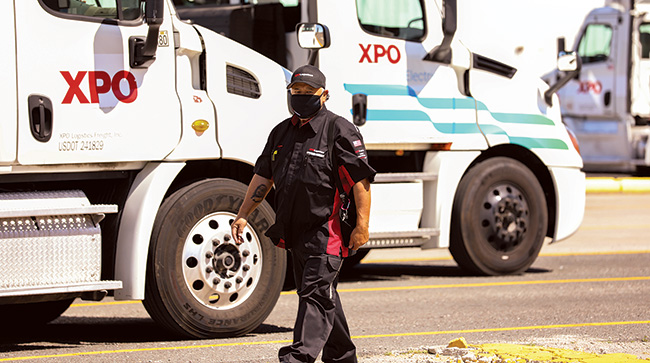
XPO emphasized technology as a tool during the pandemic. (XPO Logistics Inc.)
FedEx spokeswoman Davina Cole said the company strongly encourages team members to take advantage of vaccination opportunities as they become available. FedEx ranks No. 2 on the for-hire TT100.
While United Road hasn’t mandated employees get vaccinated or kept track of the ones who have, company leaders have encouraged them to do so.
Similarly, Hub Group did not mandate vaccinations, but Simendinger said company leaders have encouraged people to get their vaccines and have distributed communications with state-specific information. Drivers get the messages in their cabs and over email.
In order to encourage people to get their shots, Simendinger said Hub Group made vaccinations a “paid event,” compensating workers for the time they use to go to their appointments. As of May 19, a majority of Hub Group employees had been fully vaccinated, a trend the company expects will continue as availability grows.
At the company’s Oak Brook facility, Hub Group had a health care team come in and offer 250 slots for vaccinations.
“Where we’re at, I think we’re progressing much faster than folks would’ve thought, certainly a year ago if not the start of the year,” Simendinger said.
Transportation industry representatives pointed to companies’ renewed focus on employee health and wellness as a silver lining that has emerged during the pandemic.
Kane said the pandemic has prompted employers to take a greater interest in the well-being of their workers. Over the past year, Kane said engagement with his company has risen as more brokers, carriers and insurance companies have reached out for information about programs.
He also pointed out that professional drivers are often prone to comorbidities that can present health challenges. According to the U.S. Centers for Disease Control and Prevention, comorbidity means more than one condition is present in a person at the same time. Kane noted truckers are at risk of developing diabetes, hypertension and obesity. Beyond that, truckers are often older, as the industry employs an aging driver population.
“COVID, because it highlighted the importance of reducing risk and highlighted the idea that people with more comorbidities were at more risk of [not] being able to beat the virus if they contracted it, really stimulated this new interest and this demand for wellness,” Kane told TT. “I definitely see an uptick that people suddenly seem a lot more empathetic about the health of their employees since COVID.”
Another positive outcome of the pandemic, from the transportation perspective, is a heightened appreciation for frontline workers, including truck drivers.
Hub Group’s Simendinger said the pandemic had a way of making the “invisible section of the supply chain” become visible.
United Road CEO Mark Anderson cited the same trend, as well as a greater focus on worker health.
“I think there has been an increased level of respect by the general public for the frontline worker, whether it is a nurse or a truck driver,” Anderson said. “I think people are more cognizant of just general health and cleanliness.”
Want more news? Listen to today's daily briefing below or go here for more info:


